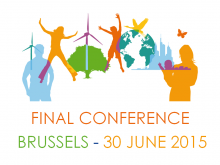Two new reports have been finalized by the CECILIA2050 consortium, both developing future-looking policy scenarios up to the year 2050 by using different approaches.
In the first study, a trade linked global input-output table with environmental extensions has been constructed for the year 2000. The study builds on a dataset from EXIOBASE that includes 44 trade-linked countries/regions with a sector detail of about 129 sectors per country. On the basis of this data three scenarios are constructed for the year 2050. The three scenarios include a Business-as-Usual (BAU) scenario, a Techno-Scenario (TS), and a Towards-2-Degrees Scenario. The overall outlook of the study is not optimistic. Its main conclusion is that reaching a 2-degrees target is possible only with deep changes in technology and deep changes in consumption and reduced growth levels. The study as well as the scenario machine, including the basic data on the regions can be used freely and is downloadable without restrictions on our website or via the website of the Institute of Environmental Sciences (CML).
The second study takes into account that developing climate policy instruments has not only an administrative and technical dimension but is also linked to governance structures. The study develops four story lines, each indicating a different direction for the development of governance for climate policy implementation and leading to core options for policy instrumentation as instrument Building Blocks. The baseline for all story lines and scenario development that has been applied in this study is the condition that each scenario could reach the 2-degrees target of climate stabilization. The governance storylines have thus been developed in a way that their probability is well above zero and they can therefore be regarded as a powerful tool to develop options for policy instrumentation. The full report can be downloadad in the publication section.


